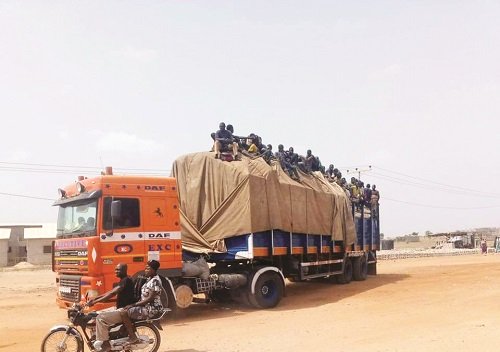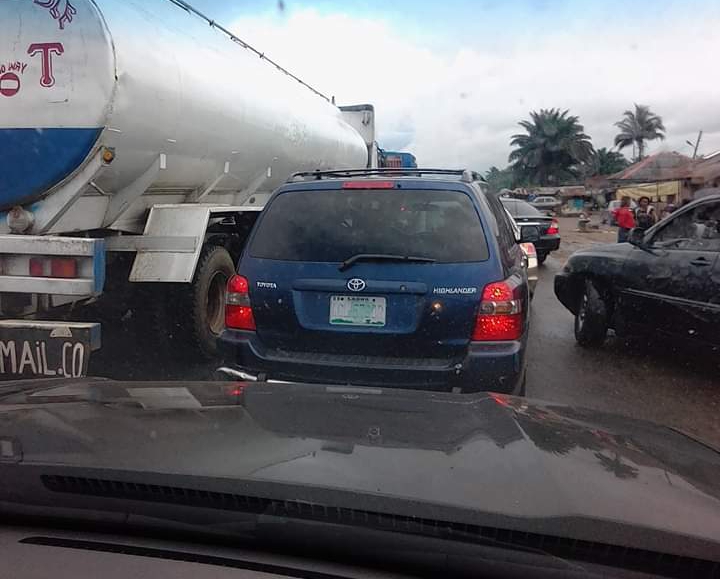About 30 per cent of truck drivers in Nigeria have failed vision tests conducted by the Federal Road Safety Commission.
Dr Boboye Oyeyemi, the commission’s CEO and Corps Marshal made this known at the 2020 Truck Renewal Conference in Abuja on Thursday.
The conference with the theme: ‘Truck Renewal System: Ensuring Road Transportation Safety’ was jointly organised by the Major oil Marketers Association of Nigeria (MOMAM), and Nigerian Association of Road Transport Owners (NARTO).
He said many truck drivers have eyesight challenges.
This made it dangerous for them to drive at night.
Boboye describing most of the drivers as“ lawless”.
He said that most of the trucks plying the road did not operate with the minimal safety standard which, according to him, had contributed to the cause of many road accidents.
“We need to take action; 30 per cent of drivers failed the vision tests we conducted. I commend MOMAN because most of its members comply to minimal safety standards but the others are yet to do so.
“ Most of the trucks on our highways do not have safety valves, we must enforce the law of no safety valves, no loading of products .
“Just yesterday, a whole family was wiped off to an accident caused by a truck with petrol in Felele Lokoja; this is avoidable if the minimal safety measures were adhered to.
“This is the time to stop all the talk shop and swing into action to avoid the reoccurrence of these on our roads,” he said.
Oyeyemi said that MOMAN and NARTO with the Department of Petroleum Resources (DPR) should join forces in ensuring that drivers complied with the rules and regulation of traffic while driving their trucks.
The FRSC boss commended the effort of President Muhammadu Buhari’s administration at reviving the rail system, saying that it would help to reduce the over reliance on the road for haulage of Petroleum products.
“If the rail is functioning well, pressure will reduce on the road,” he added.
He called for full auditing of trucks and installation of safety valves on the trucks before using them on the road.
“MOMAN and NARTO must train and retrain their members, and DPR needs to begin recertification to help reduce crashes on the road.
“The level of lawlessness is high on the side of the drivers, we witness average of 90 deaths per week in the country,” he added.
MOMAN Chairman, Adetunji Oyebanji described the theme of the Conference as “apt” judging by the situation of safety in transportation value chain in the country.
He said that globally, products were transported through the pipelines but that had stopped over the years in Nigeria due to lack of integrity.
He said that about 10,000 trucks move from south to northern part of the country with about 80 per cent without skid, automatic breaks and other equipment needed for safety.
“ MOMAN is working to ensure replacement of trucks that do not meet safety requirements. We are here today to discuss framework on truck renewal.
“ NARTO and MOMAN believe that safety of the road is possible, we will collaborate with FRSC to ensure training of drivers,” he said.
He called on marketers to ensure efficiency in product delivery adding that efficiency will help marketers to remain afloat with the deregulation of the downstream oil sector.
Also, minister of state for Transportation Gbemisola Saraki called for adherence to safety measures on the road.
She said that most of the accident on the road were caused by human factor such as using the mobile phone while driving, dangerous driving style, over speeding among others.
“Road crash is an epidemic in Nigeria and has caused more deaths than diseases. It can be avoided if drivers can be disciplined,” she said.
Represented by Mrs Angela Keyede, Assistant Director, Transport, she said that Government had embarked on road rehabilitation to address some of the challenges.
“Government is also reviving the rails but I urge you to ensure replacement of old trucks with modern trucks to reduce dangers of crashes on our roads,” she added.
The National president of NARTO, Alhaji Yusuf Othman, said the group remained relevant in the supply chain of petroleum products in the country.
He said that nearly 58 million litres of petrol consumed on daily basis in the country were transported by its members, adding that government had yet to make policies to attract investment to the sector.
He assured that its members would comply with the safety measures so as to reduce the number of road crashes in the country.



